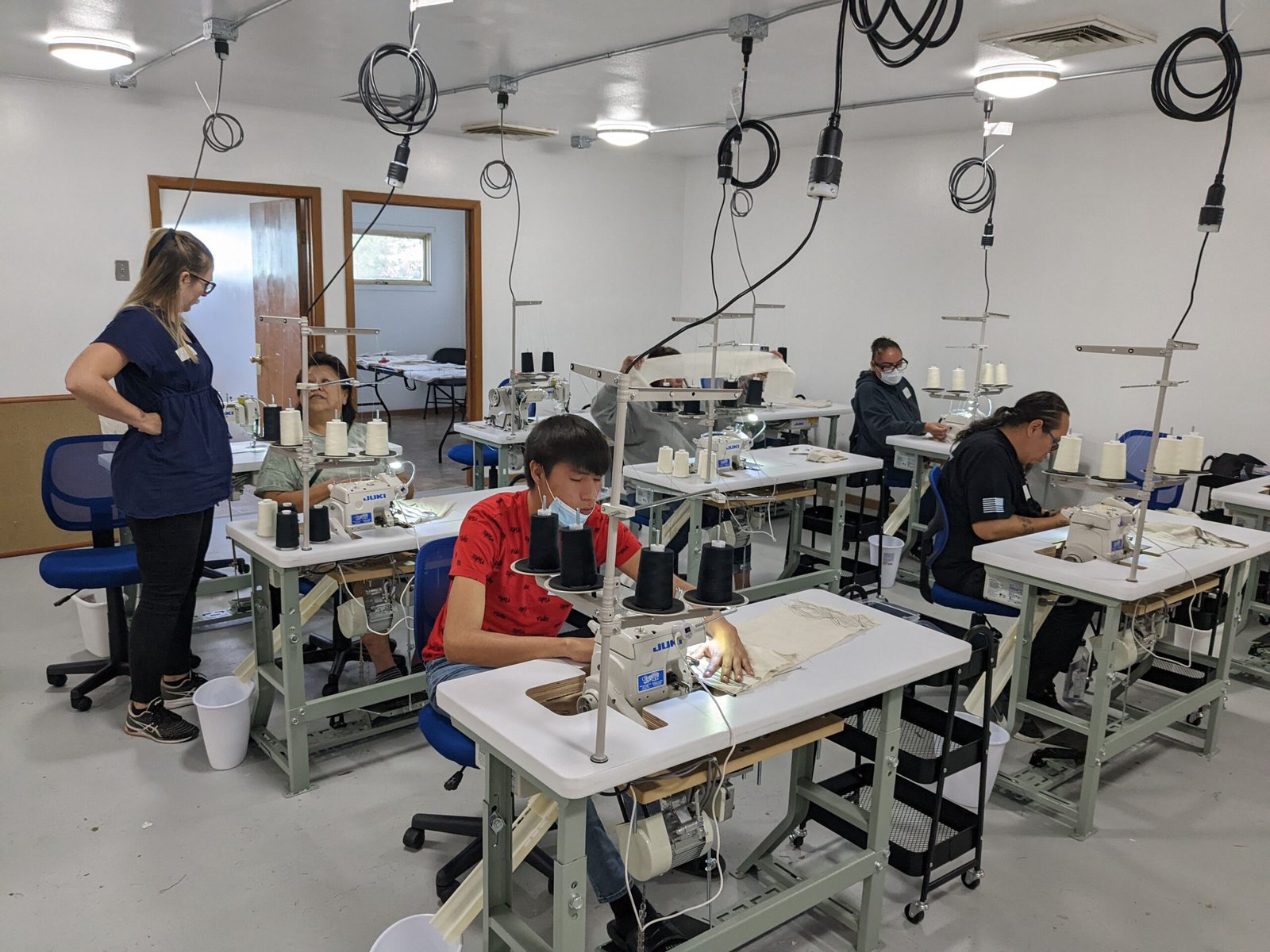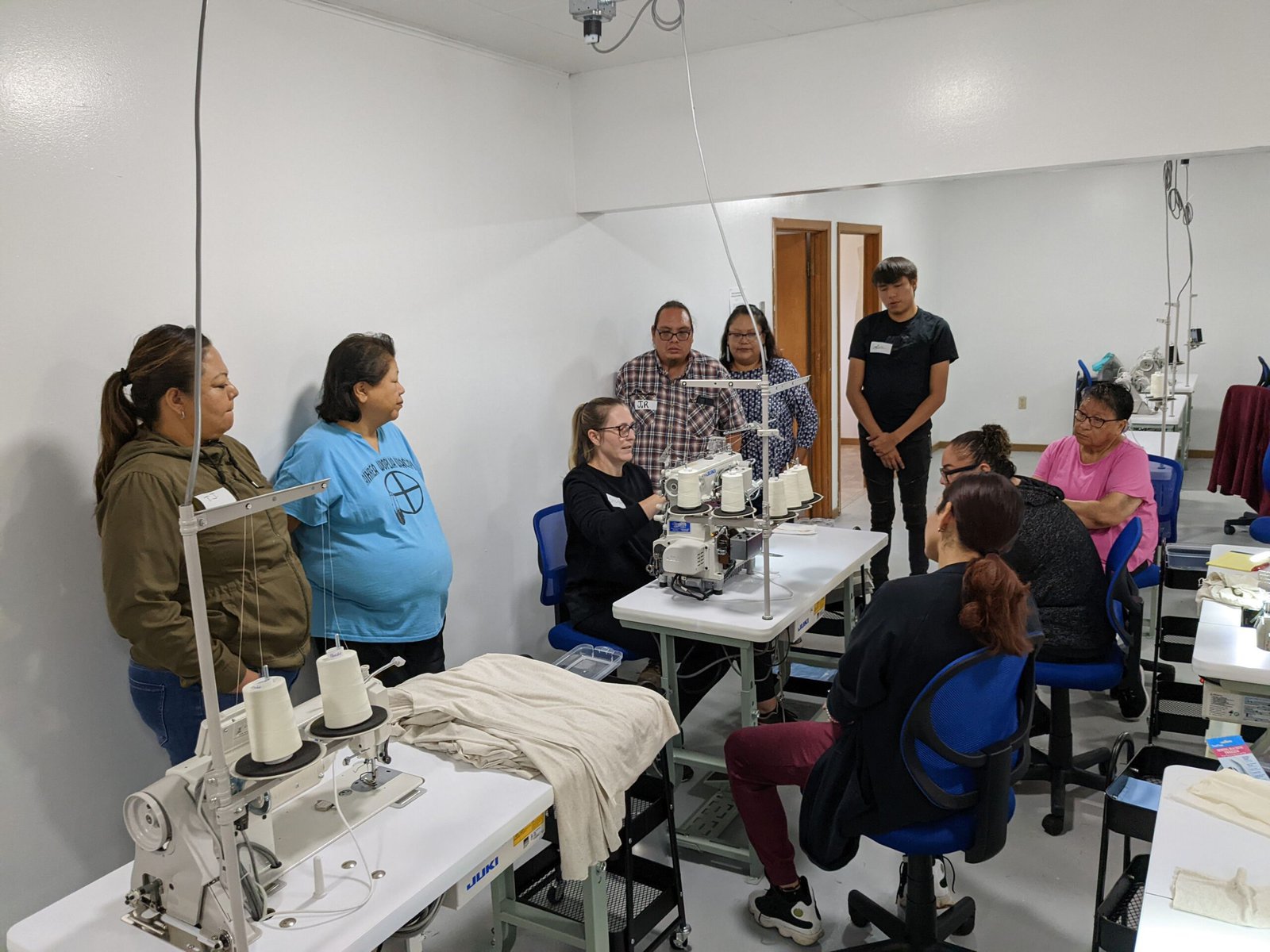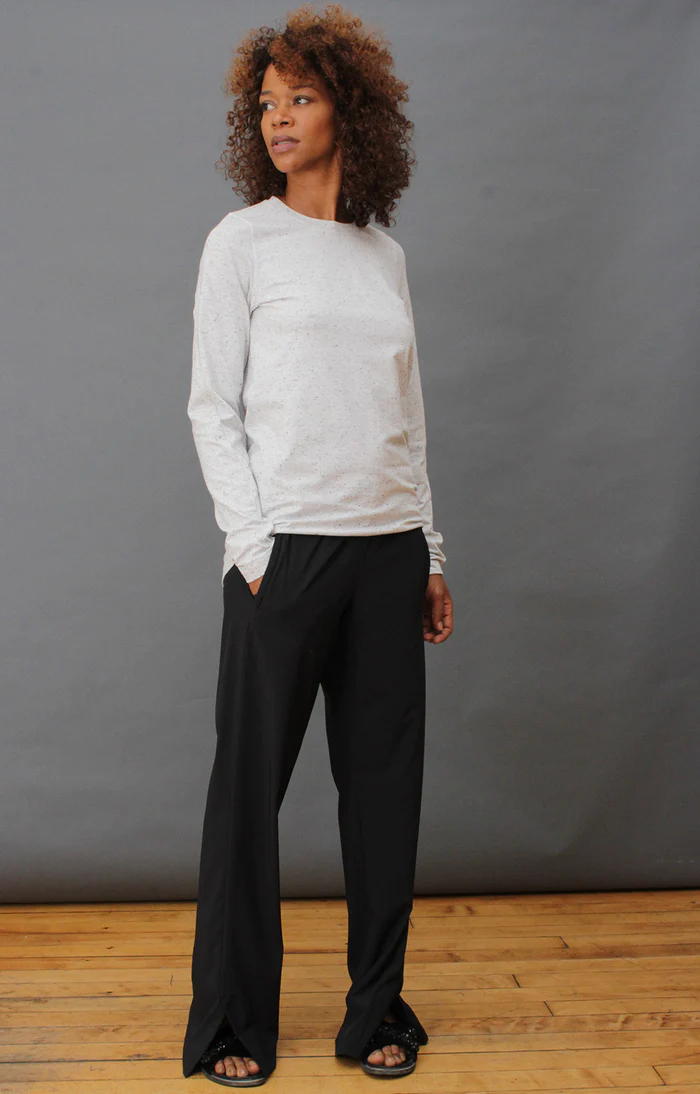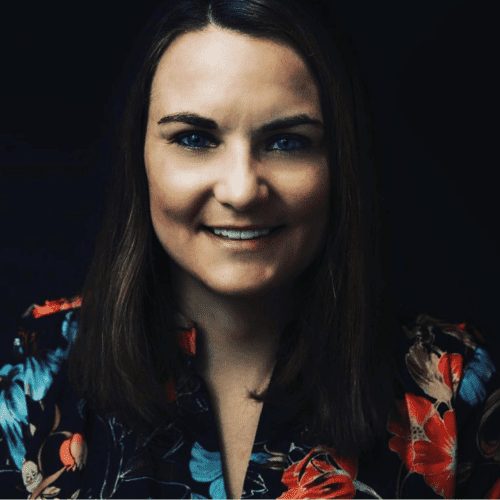When Cheyenne River Sioux tribal citizen Paulette Eagle Staff heard rumors that a company was going to be offering jobs — well-paying jobs — on the tribe’s reservation in South Dakota, she jumped at the opportunity.
Eagle Staff, 62, already knew how to sew so she had a head start as a seamstress. She began working at an ethical and sustainable apparel brand called Paskho, founded by fashion designer Patrick Robinson in 2015. Robinson had spent decades designing clothing for companies from the Gap to Armani.
“Right now, we’ve been doing shirts, and you do the shirts in different pieces,” Eagle Staff says. “And we put them together. They’re already cut out and stuff like that; we just had to put everything together.”

Sustainability has been a focus of the fashion industry for some time, but this focus on labor is what sets Paskho apart. Over the course of 2022, Eagle Staff and nearly 50 others were hired as “makers,” in an effort to move Paskho’s manufacturing from Asia to low-income communities across the United States. Makers work in pods, community-driven groups who work together or on their own time to create the clothing pieces in set locations across the U.S. In this way, Paskho has created a model that disperses well-paying jobs into communities that need them across the country.
During the height of the Covid-19 pandemic and the concurrent reckoning over racial injustices, Robinson thought a lot about consumerism, hunger and dignified work.
Robinson felt that if we were talking about “the idea that you could walk lighter on the earth and have less things, and these things meant more to you and that they had to do multiple things and line up with your values, that we were only talking about half the story,” he says. “If we were not addressing some of those issues of creating good jobs for our neighbors, creating good jobs in our communities … we had no business doing this.”
Crushed by negative news?
Sign up for the Reasons to be Cheerful newsletter.So in 2020, Paskho launched its first maker pod in New York City. The next year, another opened in Boykin, Alabama, which has an average annual income per capita of $12,000 and a majority Black population. In 2022, a third pod opened on the Cheyenne River Indian Reservation, which has an unemployment rate as high as 80% in winter months, according to the federal government.
“The founding of Paskho was all about … this idea of: ‘Could we create clothes that could actually do more for you and have more uses in your life than just the single use that a lot of clothes have?’” Robinson says.
To that end, Paskho works diligently to be a sustainable brand. In 2019, 43% of fabrics used were reclaimed, and 85% of the company’s fabrics are vegan, meaning no animal products are used. Paskho also uses recycled paper shipping envelopes instead of plastic polybags, saving 8,000 kilograms of CO2.
“I believe if humanity finds a path through global warming and inequality, we need to rethink how we live and create new habits that support our communities and our environment with our everyday lives,” Robinson says.
Bringing Paskho to South Dakota
Lakota Vogel was attending a conference in Montana when she learned about Paskho.
“We were just discussing ways to sort of scale problem-solving within the community at a faster rate than what we’ve currently been able to do in like two decades,” says Vogel, executive director of Four Bands Community Fund, a nonprofit that helps Native-owned businesses on the Cheyenne River Indian Reservation. “My solution was we just need a larger strategy for workforce opportunities for the community.”

Sitting at the same table was someone connected to Robinson, who introduced Vogel to Paskho, and conversations began about what it would look like to create a maker pod on the reservation. About a year later, the company began creating maker jobs there.
“It brings a lot more than just a business idea to Cheyenne River,” Vogel says. “I feel like it’s a true partnership between a community organization and a business enterprise, but really, [Robinson is] leading it, he’s funding it all.”
The wages set by Paskho — $13 to $2o per hour — are well above the South Dakota minimum wage of $10.80 per hour and the tribe’s minimum wage of $9 per hour, Vogel notes. She adds that while Robinson was drawn to the skilled workforce on the reservation, he has also tapped into the unskilled workforce and provided learning opportunities.

“He was willing to take an unskilled worker and teach them to be a really great craftsman, and so that was interesting to me,” Vogel says. “We believe in our training model enough that we can take anybody with initiative and drive and turn them into a worker. And it’s proven true, like the core group that he has sewing right now.”
According to Robinson, this pod —called the Oyate pod — currently consists of six employees, who train daily with a professional tailor who has over 25 years of experience. “We hire and train groups of six makers at a time,” Robinson says, “and will be hiring another six makers in the next 30 days and another six makers two months after that.”
Robinson hopes to start offering competitive jobs in other community-maker pods in Mississippi and North and South Dakota this year. “It makes a little bit more sense to put them in the same sort of geography for us,” he says.
Vogel says Native communities can sometimes show resistance and not believe in the process — past historical trauma has led to distrust of systems placed on Native American peoples. But Vogel hopes to show other communities that the Paskho’s system works, and works well.
One believer is Laura Callanan, founding partner of Upstart Co-Lab, which has helped introduce Robinson to investors. Robinson declined to disclose the company’s financial status but says the investors and foundations are committed to the mission.
Callanan says Robinson has adopted a distributed production model, which you often see in the developing world in terms of artisan crafts. “And he’s figured out that the best way to create jobs for Paskho workers is not to have one single Paskho factory where everyone needs to show up and work, but to have these worker pods, and these community-made pods, bringing the jobs to communities around the United States that have talent and artistry, but may not have the same economic opportunities,” she says.
Those opportunities can be a game-changer for workers like Eagle Staff. She says she’s happy the company has given her a special lamp and magnifier to help her see better in so she can complete the intricate stitching work. She’s also pleased the company hasn’t set any quotas and allows the makers to work on their own schedules.
“They’re giving us the time to do things right,” she says.








